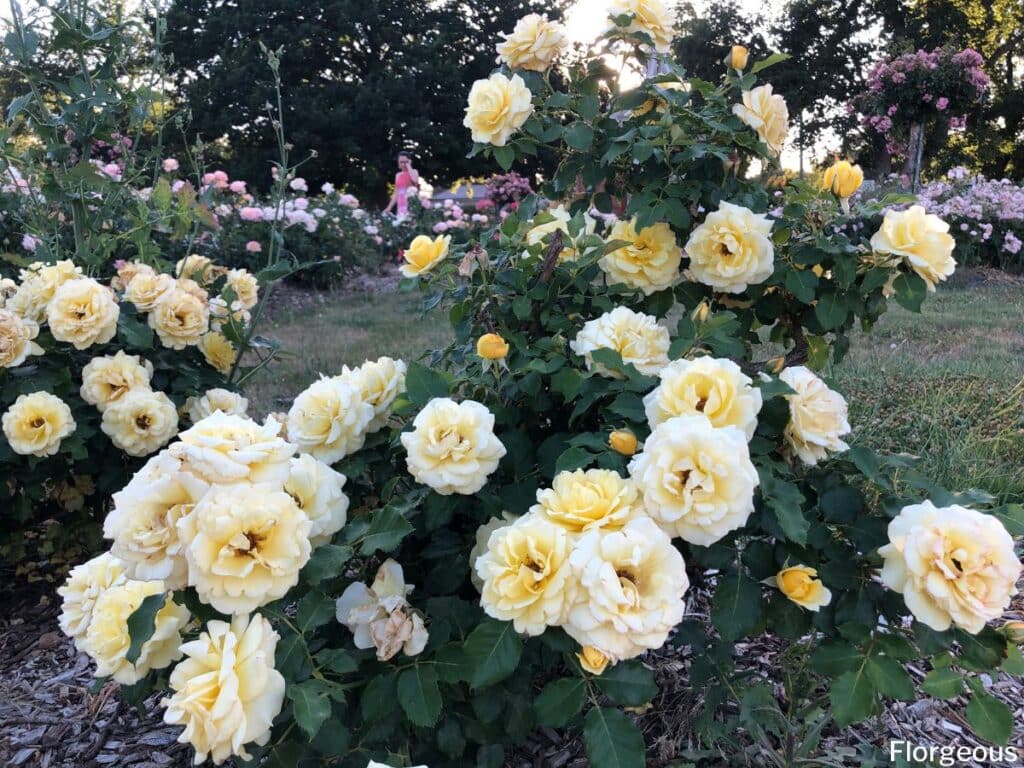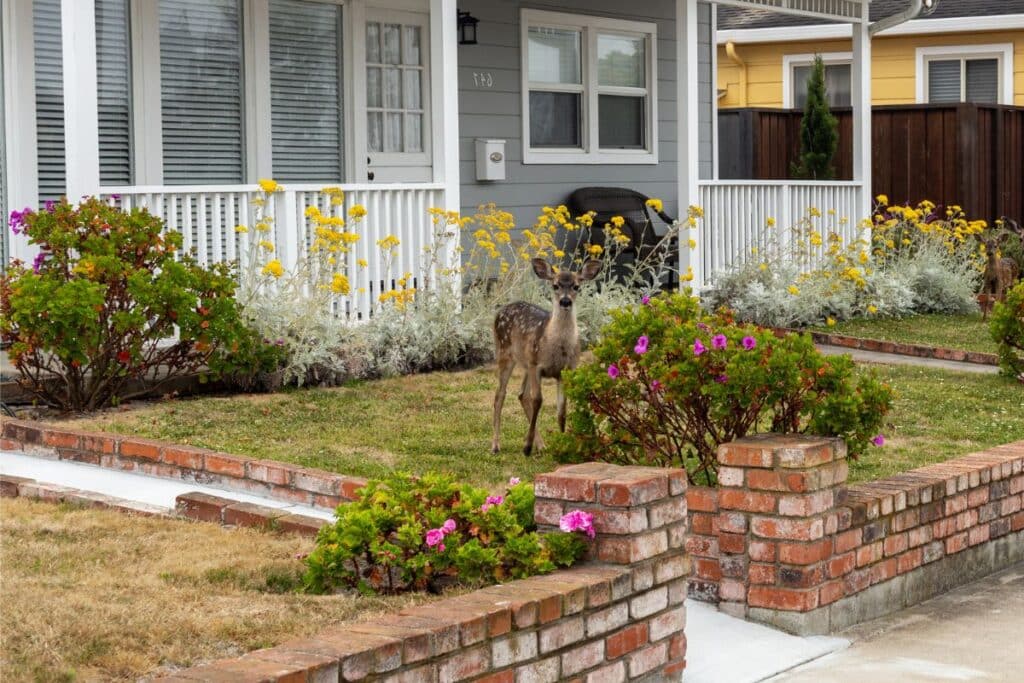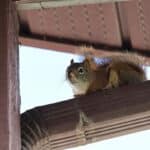Have you woken up to munched-on, demolished rose bushes? Deer might have gotten to your beautiful roses while you were sleeping.
Many rose varieties are considered a great treat for deer because of their beautiful blooms and amazing fragrances. Once the deer get to your roses, they will eat almost anything on that plant they can. Because deer have incredible grazing abilities, your roses can be at risk. We must save roses!
In this article, we will cover why deer eat roses, methods to help repel the deer, deer-resistant roses, and whether or not your roses will grow back after a deer has feasted on your plants. Read on to find out more!
Why Do Deer Eat Roses?
Roses, no matter the size, shape, color, or fragrance, attract humans and animals alike. There are various reasons why deer tend to gravitate and demolish rose bushes. Think of a favorite snack that you do not eat often and consider a treat.
Deer tend to enjoy most rose varieties, including drift roses, knockout roses, hybrid tea roses, floribundas, miniature roses, and David Austin shrub roses. These thorny canes provide a tempting feast for deer, despite their prickly defenses.
Additionally, deer eat about 5-15 pounds of trees or shrubbery a day! Their appetites are massive.
Are roses deer resistant? No, they’re not. Let’s look at some other reasons why deer eat roses here:
New Growth
Deer will eat new and old roses and their bushes, but there is something about new growth that makes the roses even more irresistible. New growth provides a tender treat for the deer.
Blooms
Why are roses so popular? Because of their blooms! They stick out like a sore thumb against their greenery and essentially provide a “eat me!” signal for deer. The blooms are typically soft and easy to pick off the bush, so they are an easy target for deer.
Shrubbery/Greenery
Deer are not simply partial to the blooms, they will most likely try and eat the whole plant itself! A rose bush’s greenery is still tasty to these animals and that includes the thorns.
Fragrance
Last but not least, a rose’s fragrance is one of the primary reasons why deer are so attracted to roses.
As you know, certain roses exude stronger fragrances than others and vary in scent. For example, some roses have a sweeter fragrance than others.
Paired with the blooms, the fragrance lures a deer in to take a bite of their tasty nature.

How To Keep Deer From Eating Roses
Luckily, there are various methods to repel persistent deer from eating your roses. Read on to find out more about these repellent methods.
Use Deer Repellents
Deer repellents are typically an organic mixture that comes in the form of pellets or sprays. Usually, the repellents will have an ingredient such as hot peppers in them or another strong scent that is displeasing to deer.
If you do use repellents, whether that be a spray or pellets, make sure to spray or sprinkle the plant material a few feet away from and around the rose bushes so the deer do not have a chance to reach over the barrier and grab the roses.
You can also spread the spray and pellets throughout your rose bushes as well.
This method works great, but the repellent needs to be replaced every few months and after heavy rainfall. Otherwise, the scent will be washed away which won’t help protect the garden from deer.
Plant a Variety With Thorns
Deer are less likely to eat the greenery of a rose bush if it has thorns. However, if they are hungry enough, they will try their best to eat as much as they can even if that means eating or getting scraped by the thorns.
If you find a particular variety of roses that has longer and/or sharper thorns, it is best to plant that one.
Use a Sprinkler
Even further, install motion-sensor automatic sprinklers! Deer hate being surprised by water, so it will be worth it to get sprinklers that are set off by their movements.
Further, deer sometimes tend to do most of their foraging and rose-eating at night. An automatic, motion-sensor sprinkler system will help you sleep better at night knowing the deer are being deterred.
Hang Some Soap
Similar to deer repellent, strong-smelling soap is displeasing to a deer. Irish Spring Soap is a good option for repelling hungry deer.
However, deer will start to get used to the scent after a while, so it is important to try a different method after a few months to keep the deer on their toes.
If you experience heavy rain, the soap will need to be replaced.
Put Out Rotten Eggs
Rotten eggs are a great way to repel deer from your rose garden. Scatter rotten eggs throughout the rose bushes and some feet in front and around the rose bushes to turn the deers’ noses up.
We recommend you purchase a spray that has a rotten egg smell in it because, typically, these sprays are relatively odorless to humans. Scattering rotten eggs will be effective, but we do not think you want that smell turning up your nose.
Put Up an Electric Fence
Electric fences are one of the most effective methods for repelling deer from eating your rose bushes. A properly installed electric fence will deter deer because they will avoid crossing the invisible shock barrier.
However, it’s crucial to ensure the fence is high enough. Deer are surprisingly agile and can jump over surprisingly high obstacles. If your fence is too short, they may attempt to jump over it and potentially injure themselves in the process. Consider using two parallel fences spaced a few feet apart to prevent this and fully protect your roses. This creates a larger invisible barrier that deters deer from attempting a jump altogether.
Use Hot Sauce
Using hot sauce can be grouped together with deer repellent, rotten eggs, and hanging soap. The smell and the taste are not good for deer.
Sprinkle some hot sauce (either straight or diluted with water) throughout your garden and a few feet out from where your rose bushes are.
You will have to replace the hot sauce after heavy rain or a few months.
Use Solar Lights
Alongside sprinklers, deer hate really bright lights. They can be temporarily blinded when exposed to floodlights.
This is also an effective method for when you need to repel deer while you’re sleeping. When deer approach your garden under the cover of darkness, the lights will be even more effective.
It is best to try and get automatic, motion-sensor lights so the deer are constantly surprised by the light.
Try Electronic Repellent Devices
Electronic-repellent devices include lights that mimic predators (primarily their eyes), flashing lights, water squirters, etc.
These types of devices are great for keeping deer on their toes. We recommend rotating repellent methods such as these so the deer do not get used to their location.
Grow Plants Deer Don’t Like
Believe it or not, there are plants that deer do not like and will steer clear of! This is largely due to the strong scent of these particular plants.
When planting plants deer do not like, you can plant them as a border to your rose bushes, a few feet from your rose bushes, and even at the entrance of your garden. The idea is to create as many barriers as necessary to deter deer from your roses.
Some of these plants include the following: lavender, sage, mint, hostas, other herbs, butterfly bush, poppies, daffodils, astilbe, coreopsis, columbine, bleeding heart, marigold, dusty miller, and ageratum.
Remove Other Food Sources for Deer
Much like any other animal, deer are attracted to places with food readily available.
If you have trash cans relatively near your rose bushes, you might want to consider moving them farther away from your garden area. If deer smell the human food in your trash cans, then they are more likely to sniff out your rose bushes as well.
Additionally, if you have other edible young plants that are deer-friendly, you might have to use some of these repellent tips on your other edible plants as well.
Will Roses Grow Back After Being Eaten By Deer?
Luckily, roses can be pretty resilient if they are taken care of properly.
The key to helping your roses bounce back after a deer attack is to prune away the damaged areas, focusing particularly on removing any broken or browsed tender growth.
In addition, you can also seal off the wounds to help protect them.
Further, water the roses regularly to help keep the soil moist.
We recommend staying away from fertilizing the roses too heavily during their healing period because they need time to rest and properly heal.
After you notice some new growth that has come back and vibrancy to your rose bushes, you can add an appropriate amount of fertilizer to help your roses thrive.
Which Roses Do Deer Not Eat?
When growing and caring for roses, the last thing you want is to see them getting eaten by deer.
There are a few roses that deer tend to stay away from, so you may want to plant these instead.
Swamp rose (Rosa palustris)
Swamp roses are thick, thorny bushes that attract birds and bees. Because of their thorny nature, they tend to keep the deer away. It can grow anywhere between 3-8 feet tall.
They bloom mid to late spring and bloom pink flowers.
Virginia rose (R. virginiana)
Virginia roses are suckering shrubs that can grow between 4-6 feet tall. The Virginia roses’ stems are hairy and have curved thorns. The texture is typically unpleasant to deer so they will likely stay away from the stems.
This species is a hardier species of rose and can bounce back under harsh weather or pruning you will have to do if deer eat the plant.
Pasture rose (R. Carolina)
Pastura roses (or Carolina roses) are smaller, prickly shrubs that grow to about three feet. Their primary bloom color is pink, but the bush can bloom red flowers come the fall time.
This type of rose is both deer proof and rabbit-resistant because of its prickly stems. Additionally, it will attract birds and bees which are beneficial for pollination.
FAQs
How do you keep deer from eating roses?
To deter deer from eating roses, consider using deterrents like fencing, repellent sprays, or planting deer-resistant plants nearby to divert their attention.
Are some roses deer resistant?
Some rose varieties are more deer-resistant than others. Varieties with thorns or strong fragrances, such as rugosa roses or Knock Out roses, are often less appealing to deer.
Do deer eat rose of sharon?
Rose of Sharon (Hibiscus syriacus) is generally considered deer-resistant due to its tough leaves and less palatable nature, but hungry deer may still browse on it if other food sources are scarce.
Final Thoughts
Unfortunately, deer love your beautiful and rare roses as a treat. They are attracted to the stunning blooms and the fragrance that wafts through the air. Deer also eat knockout roses. Once the deer have found your rose bushes, they will partake in a feast.
Not only do deer only eat the blooms of your rose bushes, but they will eat the leaves, stems, and general greenery of the entire bush. There is little you can do to deter a rose’s allure from a deer.
However, if a deer does get to your roses, there is a chance to save them. Pruning is the most effective method for helping your roses heal, grow, and thrive after a deer’s feast. Do not be worried if you have to cut back a lot of damage. Pruning is extremely beneficial!
If you are not a fan of replacing repellent or motion-activated repellents, try planting deer-resistant plants such as lavender, sage, marigolds, etc. These plants have an unpleasant smell to deer.
Similarly, keep extra food away from your garden. This includes food that is in your trash cans, dirty grills, and plants that deer consider to be edible. Keeping the scent of food away from your entire rose beds or yard will not entice them to explore your space further.
Finally, an electronic fence is possibly the best defense against deer because it physically keeps them out. Make sure that the fence is high enough so they do not jump over.
Start off with one method and monitor how the deer react to it. If that method does not work out, try another one or a few of them at the same time. Take time to figure out which method is right for you.
*image by pkorchagina/depositphotos







